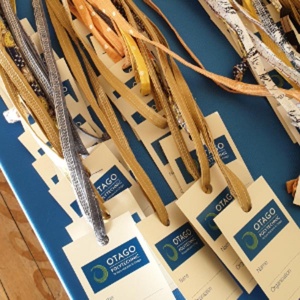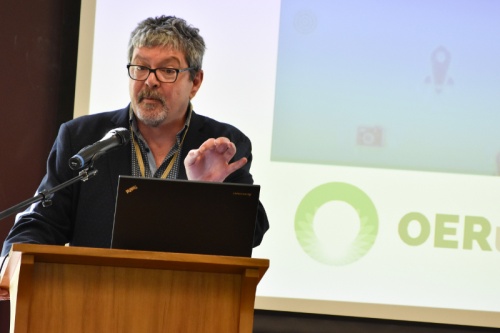Coep/2019 symposium
2019 Symposium proceedings
A better world through open education, the inaugural symposium of the Centre for Open Education Practice, was hosted by Otago Polytechic in Dunedin, New Zealand, on 5th - 6th December 2019.The symposium's theme was social justice and open education. The programme covered a wide range of topics through keynote addresses, presentations and workshops. The symposium closed with a Planning Sprint, where participants brainstormed ideas for progressing mainstream adoption of open education practices in Aotearoa New Zealand. This was the first stage of COEP's initiative to develop a transparent and collaborative planning process for Aotearoa New Zealand in response to the 2109 UNESCO Recommendation for OER.
Notes from the sessions, and links to slides and video recordings where available, are presented below. The notes were taken by a different 'scribe' for each session, so reflect the notetaker's individual perspective.
(This page is displayed in an 'accordion' format. To view the content for each speaker, click on the small down arrow on the right-hand side of the page next to the speaker's name.)
Contents
- 1 2019 Symposium proceedings
- 2 DAY 1 - 5th December 2019
- 2.1 Welcome and keynote presentations
- 2.2 Morning parallel sessions
- 2.3 Afternoon plenary sessions
- 2.4 Afternoon parallel sessions
- 2.4.1 Sustainable RoVE Futures
- 2.4.2 Ako and Open Education Practices: What We Share, Who With and Why
- 2.4.3 Open Knowledge and Open Educational Platforms
- 2.4.4 It’s a Small World After All: The OER’s Implementation of Micro Courses and Credentialling
- 2.4.5 Hacking a Textbook… in a Weekend
- 2.4.6 Open Education and training in the travel and tourism industry
- 2.4.7 "Will that be on the wiki?"
- 2.4.8 First Day Closing remarks
- 3 DAY 2 - 6th December 2019
DAY 1 - 5th December 2019
Welcome and keynote presentations
Welcome and Opening Remarks
| Ron Bull (Otago Polytechnic) and Wayne Mackintosh (OER Foundation) |
|---|
|
Keynote: Creating a Course Towards Open Innovation
| David Porter (eCampusOntario) |
|---|
|
Principles underlying open education
Zero textbook costs
Resources, infrastructure and human networks
A collegial approach to exploring emerging practice (open pedagogy)
Anatomy of an empowered educator Fellowship of scholarship and academic pursuits OER policy drives us forward Guidelines on development of OER policies |
Keynote: Open Textbooks - What’s Stopping Us and Why We Need Them
| Cheryl Brown (University of Canterbury) |
|---|
|
What are textbooks? How do they fit into OER? What are the values? Open can be different things Costs are increasing and excessive to students Students will seek alternative resources Findings show of university students in first year, 82% required to purchase texts, average cost $184-$384 Most students don’t buy textbooks and seek other resources Various reasons for not using library
OER
Buying texts causes stress, anxiety, hardship, poverty Students finding some texts were not used by lecturers Some students found texts were not relevant to assessment Lecturers can find alternate sources of information and communicate it to their colleagues Are textbooks still relevant? |
Morning parallel sessions
Student Views on Textbook Costs
| Sarah Stein, Simon Hart, Philippa Keaney and Richard White (University of Otago) |
|---|
|
Key focus: student experience Inter-institutional collaborative multi-focused
Winder philosophy / context
Knowledge: ‘A fire to be kindled’ Process:
How to get out of these practices / pedagogy ‘not working’ What is a ‘textbook’? How does it function? Being ‘open’ - alternatives to ‘textbook’ Are they relevant? Baseline Teachers perspective - as soon as there is a barrier (there is a problem) |
Open as a Mindset
| Ray O’Brien and Sam Mann (Otago Polytechnic) |
|---|
|
‘Open’ through leadership for change
Open structures
Personas
Testing structure
Open to:
|
Confessions of an Open Access Journal Editor
| Alison Fields (Editor-in-Chief, Journal of Open, Flexible and Distance Learning) |
|---|
|
Confessions: Alison works for two journals - open access and commercial
Comparisons between the two journals Everything exists together - commercial publishing houses are adapting as are OA journals
Similarities
Differences
Value of access
JOFDL access points
Value and quality
Cost
CONZUL in NZ
What journals should we read? Considerations
Costs 2,000GBP or $3,000US to get article published (if author chooses to pay so article OA) |
Maori Data Sovereignty and Open Source
| Chris Cormack (Catalyst) |
|---|
|
Te Mana Raraunga
Data sovereignty
Concern: Iwi store whakapapa info in offshore data stores. What are the risks? 6 principles of Maori data sovereignty
Open source software
Kaupapa Maori is always mindful of context
Open data: power-based analysis
Comment section
|
The Future of Academic Journals
| Sam Mann and Ray O’Brien (Otago Polytechnic) |
|---|
|
Now: hospitals and tertiary institutions pay money to publishing houses Inspiration
Future? Old
New
|
OERu’s Delivery Model for Changing Times: An Open Source NGDLE
| Claire Goode (Otago Polytechnic) and Dave Lane (OER Foundation) |
|---|
|
The network
Reason: institutions LMS focus on the learner Support learner
Pedagogical opportunities for teachers
SDGs for quality education Learner-facing ‘tech wheel’
Scalable
Diverse technologies used: i.e. Wordpress, Rocket.chat, Couch.db etc. Benefits
Uses ‘Docker’ - manages ‘FOSS’ complexity Costs?
More info
oer.nz/coep19ngdle FOSS code: [1] |
Afternoon plenary sessions
Get Your Copyright Game On!
| Mandy Henk (Tohatoha) |
|---|
|
In this lively session participants learnt about Creative Commons licences through Tohatoha's card game. |
Keynote: Social Justice Matters - A Reflection on the Promise and Possibility of Tertiary Education
| Oonagh McGirr (Otago Polytechnic) |
|---|
|
Why are we doing this? Social justice education for a truly open world
Context for good
A knowledge economy or a learning society? Aotearoa - a case study
Collective or individual What will you do on Monday?
Leaders do the right thing… |
Afternoon parallel sessions
Sustainable RoVE Futures
| Wayne Mackintosh (OER Foundation=== |
|---|
|
[Video not available] Thought experiment for open education futures in NZ What is the potential for OE solutions in RoVE? Three main things government can do
$30 million saving if all educational resources were openly licensed
Presented this to MoE as proposal - have received letter in response, but no commitment Question re: using the CoVE as an entry point
|
| Ron Bull (Otago Polytechnic) |
|---|
|
[Video not available] Ever evolving circle of knowledge creation We think about:
But it can also include openness to interpretation "Ako" is commonly linked to concepts such as
But from Iwi-Maori perspective, "ako" is a quasi-traditional knowledge transfer system First tenet
Second tenet
Third tenet
Fourth tenet
Maintain discourse and epistemologies behind the knowledge |
Open Knowledge and Open Educational Platforms
| Paul Stevens (Catalyst) |
|---|
|
Nine years experience at Catalyst What is ‘open knowledge’? Reuse, use, redistribute, open data, open source How can we bring open-source platforms together to provide a better solution?
Lots of good open source platforms - if you’re not using them, why not? Case studies
Q: What can we do to convince the government to move to open source platforms? A: 2-pronged approach
Q: What sort of support can cloud-based companies such as Catalyst provide / upskill people such as OT students? A: Can we put a system in place that doesn’t bind us to a company, e.g. Amazon / Google / Microsoft? Can we teach skills / processes in a cloud-agnostic way? |
It’s a Small World After All: The OER’s Implementation of Micro Courses and Credentialling
| Claire Goode and Simonne Wood (Otago Polytechnic) |
|---|
|
Goal of OERu is to widen access to education by
Needed to develop ways to recognise learning by credit transfer in different countries around the world
EduBits: reflect specific experience and capabilities of individuals, regardless of how you have obtained this, e.g. electric vehicle battery diagnosis - an unregulated industry in NZ; trying to ‘get ahead of the game’
A sustainable parallel learning universe for all. A reminder that this is about creating options and solutions for our learners Q: Are micro credentials linked to programmes, or are some not associated with courses? Does an EduBit need to be ‘pinned to a degree canvas’? A: No, they are stand-alone and cane be done isolation. They will be recognised as such by an employer. |
Hacking a Textbook… in a Weekend
| Richard White (University of Otago) |
|---|
|
bit.ly/hackingatextbook Ground up initiative at end of 2013 - took about six months and 20 people Simplified process of the development cycle of ‘hacking a textbook’ Inspired by and article so decided to do the same (Media Studies 101) Collaborated with Erica, who wanted to design a better book
Who was interested? Academics and librarians Got some funding (C.C.) and a project manager Signed an memorandum of understanding between participants Got tech side sorted out
Concurrently compared curricula and drew up chapters
Take aways: fun, great sense of achievement Post hack: tidy ups, editing Released
https://mediatexthack.wordpress.com/ Reflection: not PBRF-able as not peer-reviewed https://blogs.otago.ac.nz/texthack/ Any recognition from University of Otago? No Has it been updated? No, but it’s probably due for a review |
Open Education and training in the travel and tourism industry
| Hilary Jenkins (Otago Polytechnic) |
|---|
|
[Video not available] Wiki Educator as a platform Declining numbers in 2007 meant change was needed Applied for funding support
Integrating use of Wiki Educator through development of new programmes Wiki Educator allows for all L3, L4 and L5 programmes to be on one page Wiki includes lesson plans, resources, research that are completely open for use 2015/16 - TROQ - D4LS - Moodle as closed platform - still use open resources - in the future use open resources for EduBits and high schools |
"Will that be on the wiki?"
| Kim Thomas (Otago Polytechnic) |
|---|
|
[Video not available] Introduced to Wiki Educator in 2007
|
First Day Closing remarks
| Oonagh McGirr (Otago Polytechnic) |
|---|
DAY 2 - 6th December 2019
Workshop
Practical Ways to Promote Academic Engagement in OER
| Wayne Mackintosh (OER Foundation) |
|---|
|
[Video not available] Small and concrete ways to engage in open education Why did you come?
Potential badges for teaching competence, like EduBits Competency framework Take stock of what resources are open and available for collaboration Observe: report back to team Copyright / open access linked Transformative agreement in publishing Can prohibit some from publishing Working on open access policy Cost of publishing vs. open access Access to resource for people outside of university environment limited Completely new to OER
Access to publicly funded research in health research Should be clear info pipeline from researchers to health workers Differentiate between info that is not accessible and accessible to joe public OER not thriving at Otago Uni Policy vs. practice Research focused not so much in teaching areas Income stream Reward / incentive structure of uni Success in Canada investing in open textbooks Discussion about income generated from research Some subjects generate more money than others Would be valuable area for some research but possibly difficult to get responses Proportion of total income provided by government should represent level of open access Marketing aspect - zero cost textbooks Difficult to engage with student associations RoVE: Opportunity for OER? Yes Connection between professionals in practice and the teaching of discipline Small off shore campus of Uni of California (Channel Islands - Cal State Uni) has gone entirely OER Understanding of difference between ‘open’ and ‘online’ Otago Poly incorporating OER courses into formal programmes Still get government funding Te reo uptake in Australia How do we ensure data is clean? Sustainability Lack of transparency in IT sector - a lot of mistrust |

